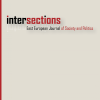
In democratic political systems, the main actors of representative democracy are party leaders, elected parliamentarians, and cabinet members. In addition to these, there are other ways of decision-making in a democratic political system such as participatory and deliberative democracy. These involve citizens and non-governmental organizations that aim to improve the social acceptance and effectiveness of political decisions. Research on democratic innovations focuses on successful practices and methods aimed at changing democratic governance and political structures to improve them. Such innovations range from direct democracy (e.g. referendums, agenda initiatives, recall) to deliberative practices (e.g. deliberative polling, consultative mini-publics, participatory budgeting etc.) in offline and online settings.







.jpg&w=100&h=100&zc=1)


